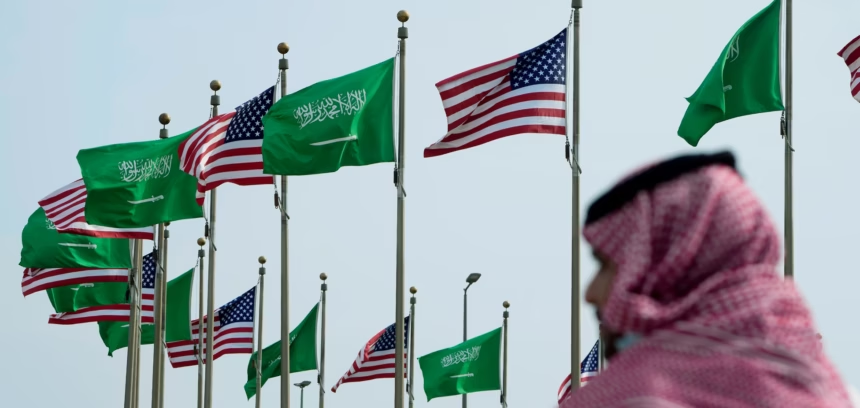In a significant development reflecting the evolving security landscape of the Middle East, Saudi Arabia and the United States have finalized a new $3.5 billion arms agreement. The deal, which includes the sale of medium-range missiles and integrated air defense systems, marks a continued deepening of military cooperation between the two nations. According to Alkhaleej Online, this partnership is part of a broader strategic vision centered on strengthening regional stability and countering emerging threats.
Expanding Strategic Cooperation
The Saudi-American military relationship has long served as a cornerstone of regional security architecture. Over decades, this partnership has evolved beyond transactional arms exchanges to a more integrated strategic alliance. The latest deal builds on this foundation by expanding technological support, training programs, and logistical services—indicating a more institutionalized defense collaboration.
The timing of the deal is noteworthy, coming amid escalating geopolitical shifts across the region. With Saudi Arabia increasingly relying on Washington for advanced defense technologies and training, the new agreement underscores Riyadh’s commitment to a long-term security alliance with the U.S., especially in light of evolving threats from non-state actors and regional rivalries.
Details of the $3.5 Billion Deal
As part of the recently confirmed agreement, Saudi Arabia will receive advanced AIM-120C-8 medium-range missiles and a comprehensive support package that includes maintenance services, spare parts, software, and documentation. The Pentagon announced that the deal encompasses over 50 logistical divisions and includes both classified and unclassified technical support.
This defense procurement is not limited to hardware. Analysts cited in the report emphasize that it also includes long-term operational frameworks for integrating these weapons systems into Saudi defense infrastructure. This includes training, simulation programs, and localized technical assistance, further cementing the alliance’s structural depth.
Geopolitical Implications
The strategic implications of this deal extend beyond bilateral defense cooperation. It comes at a time when the region is witnessing accelerated realignments, particularly amid uncertainty over the return of Donald Trump to the U.S. presidency and his known affinity for Riyadh. Historically, American administrations have used arms deals as tools of geopolitical alignment and to solidify alliances. This deal fits squarely into that tradition, reinforcing Saudi Arabia’s central role in the U.S.’s Middle East policy.
The United States’ use of arms diplomacy is not new, but the scale and timing of the Saudi deal elevate its political significance. Reports suggest that the administration views the partnership as key to securing strategic interests in the Gulf, especially as tensions persist in neighboring zones like the Red Sea and Eastern Mediterranean.
A Surge in U.S. Arms Deals Across the Gulf
The Saudi deal is part of a broader trend of expanding U.S. military exports to Gulf Cooperation Council (GCC) countries. A comparative review of recent contracts shows Qatar’s acquisition of drones and guided bombs worth $1.96 billion, Kuwait’s $425 million deal for Patriot missile system support, and the UAE’s continued negotiations to revive a $23 billion package suspended since 2021.
From 2020 to 2024, Bahrain topped the list of U.S. arms importers among GCC states with 97% of its arms sourced from the U.S., followed by Saudi Arabia (74%), Kuwait (63%), Qatar (48%), and the UAE (42%). This trend highlights Washington’s enduring military influence in the Gulf and the GCC’s heavy reliance on American defense systems.
Strategic Autonomy or Continued Dependency?
While the deal further integrates Saudi defenses with American systems, Riyadh has also been working over the past decade to reduce its dependency on foreign weapons by expanding local defense manufacturing. Saudi Arabia now ranks fifth globally in defense expenditure, with its military budget reaching approximately $75.8 billion in 2024—representing 4.5% of global defense spending.
Nevertheless, the ongoing preference for U.S.-made advanced systems reflects a dual-track approach: developing domestic capabilities while maintaining strategic partnerships with global powers. This balancing act is aimed at ensuring a sustainable military capacity that is responsive to regional threats and geopolitical uncertainties.
Anticipation of a Larger Defense Package
Reports from April indicate that the $3.5 billion agreement may be just a prelude to a much larger defense package exceeding $100 billion, to be announced during a potential visit by Donald Trump to Saudi Arabia. This anticipated “mega deal” may include C-130 aircraft, radar systems, and additional missile technologies. Companies such as RTX (formerly Raytheon), Boeing, Northrop Grumman, and General Atomics are expected to participate.
If confirmed, the deal would rank among the largest in the history of U.S.-Saudi defense relations and could reshape the region’s security dynamics by giving Saudi Arabia a strategic edge in terms of advanced weaponry and operational readiness.
Conclusion: A New Phase in Gulf Security Architecture
The emerging pattern of arms deals signals a new phase in Gulf security planning. Saudi Arabia’s consistent investment in advanced U.S. systems reflects both the perceived urgency of regional threats and the strategic value placed on its partnership with Washington. The U.S., in turn, continues to use arms sales as a lever of influence and a mechanism to ensure long-term alignment of interests.
As geopolitical uncertainties continue to evolve, particularly with the possibility of leadership changes in Washington, Riyadh appears to be securing its position as a key military and political player in the region. The scale, scope, and strategic context of the recent arms deal underscore its potential to shape not only bilateral relations but also the broader regional security order.




